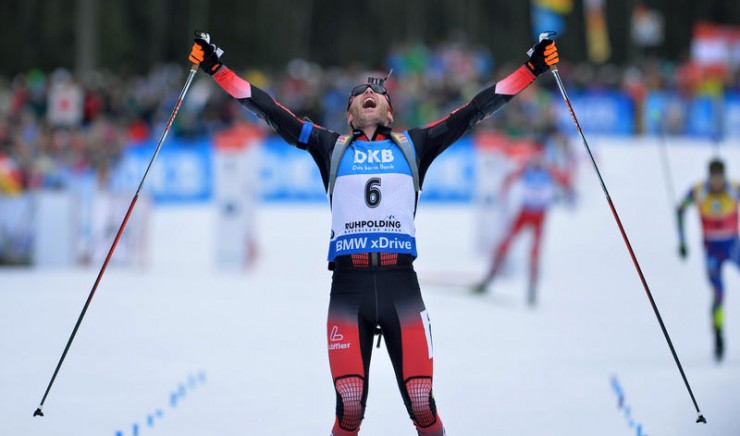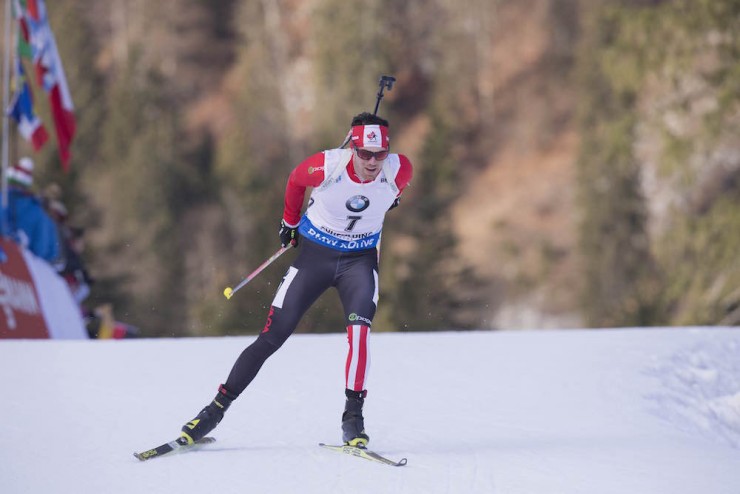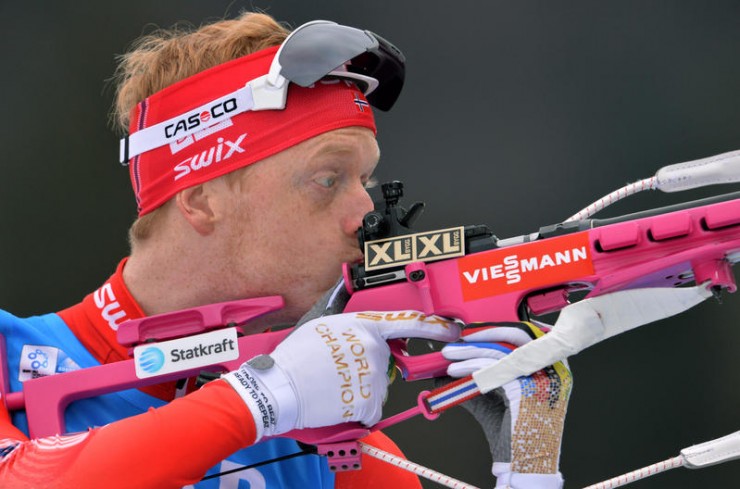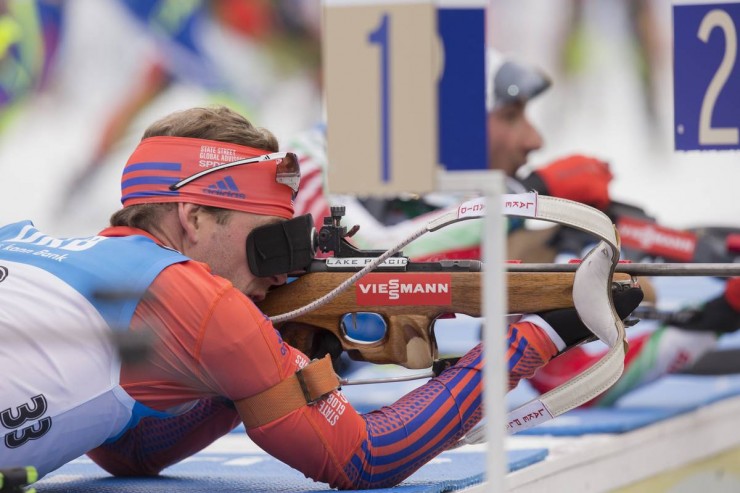
On Saturday, the sixth starter and fast-shooter Austrian Simon Eder won the IBU World Cup men’s 12.5-kilometer pursuit in Ruhpolding, Germany. Thanks to his quick-trigger finger and a single miss in the first of four shooting stages, Eder moved up the field and jubilantly crossed the line in 33:19.1 minutes, tilting his head back and raising his arms to the sky.
A few minutes before, Eder had anxiously looked back repeatedly on the final loop. His lead kept shrinking, but he managed to hold off France’s Martin Fourcade, who had two penalties — one on each of the last two stages — to finish 4.2 seconds back in second, thereby extending his lead in the overall World Cup standings. Third place went to Michael Slesingr of the Czech Republic (+5.1) for his first podium of the season, one of only two men who shot clean.
The Norwegians, who swept the podium in Friday’s sprint, settled for fourth and fifth place on Saturday, with Tarjei Bø finishing last in the chase group in fourth (8 seconds after Eder) with three penalties, and Emil Hegle Svendsen placing fifth (+26.2) with two penalties.
Canada’s Smith Achieves Sixth

In a photo finish for sixth, Canadian Nathan Smith lunged across the line to beat Friday’s sprint winner Johannes Thingnes Bø, who had four penalties and ended up seventh, by 0.1 seconds.
The 15th starter, Smith rallied to sixth for his best result of the season, finishing 45 seconds behind Eder and 40 seconds off the podium.
After skiing a quick first loop (the ninth-fastest of the field), Smith had one miss in the first prone stage.
“It wasn’t the start I was hoping for but I just did my own race and steadily moved back up,” Smith wrote in an email. At the end of the day, his overall course time ranked 13th.
After his early penalty, he managed to avoid any more, shooting clean throughout the next three stages (1+0+0+0).
“I am really proud of my final standing. That is exactly what I need to do to get the best result I can,” Smith wrote. “I think [Bø] left a few seconds behind me and caught up by the last climb. Usually I’m pretty strong for the last 200 [meters] so I like my chances in sprint finishes. It doesn’t bother me to be toe to toe in those situations, and is preferable to crushing myself trying to maintain a gap the entire loop.”
“I’m super happy with it,” he said in a Biathlon Canada press release. “The best part is I shot clean on my last standing. I have had trouble with it a few times this year when I had the opportunity to finish in the top-six.”
Eder’s Quick-Draw Method
Eder, a 32-year-old left-handed shooter widely known among biathlon peers and fans as extremely fast while not always accurate, made use of his big strength on Saturday and posted the fastest overall shooting time of all athletes, twice staying under 20 seconds. He only slightly slowed during the final shooting, taking a few additional seconds to make sure he hit all his targets for the sixth-fastest time.
“After the first miss I honestly had already given up hope for a podium, but I felt extremely good skiing,” Eder told Austrian TV broadcaster ORF after the race. “When I was able to close the gap to Bø and Svendsen on the third loop, I knew a lot was still possible.”
The head of Austria’s biathlon association Markus Gandler was impressed by Eder’s strong nerves in the final shooting: “Hats off to Simon that he was so cool and crafty, that was a world-class performance,” Gandler told ORF.
Several years ago, a couple competitors nicknamed Eder “Lucky Luke,” after a cowboy from a Belgian comic book series, which started in the 1940s and became popular in German-speaking countries. The character is known for being able to “shoot faster than his shadow” and the name stuck as fitting for the Austrian biathlete.
“I think there are many talents who can shoot fast, but my strength is that I also dare to try it in competitions. I think it’s possible to shoot even faster,” he told ORF.
With thousands of fans around the course and in the arena cheering him on, including Eder’s father, Alfred, who currently works as a biathlon coach for Belarus, he managed to defend his lead after the final shooting against a chase group of Fourcade, Slezingr and Tarjei Bø.
“In the last round I went out full throttle and tried to somehow leave Fourcade behind me. To win here in Ruhpolding in front of this audience of course is a dream,” Eder said in an Austrian Skiing Federation press release.
This was Eder’s third-career individual World Cup win and his best result since a 2014 victory in Oslo, Norway, also in a pursuit. It was also Austria’s first podium of the season.
“I think there are many talents who can shoot fast, but my strength is that I also dare to try it in competitions.” — Saturday’s pursuit winner Simon Eder, of Austria
Fourcade told reporters after the sprint that he felt sick the night before, mainly starting because his biggest competitors for the overall World Cup title — Germany’s Simon Schempp and Norway’s Ole Einar Bjørndalen — had skipped this weekend due to illness.
On Saturday, Fourcade failed to post his usual No. 1 course times, instead recording the ninth-best time overall. A miss in each standing stage cost him a total of two penalty laps, and Fourcade could not quite make up a 16.9-second gap to Eder on the final round, finishing 4.2 seconds back in second.
“There are two ways you can look at my result today,” Fourcade said at the post-race press conference. “From one side, I am satisfied about being back on the podium and gain points for the [World Cup] Total Score. At the same time, we can also see it as a lost victory. This is biathlon, and I like to play; I think my mistake today was attacking too much.”
He considered Eder somewhat of a surprise: “I did not expect Simon to win, but when I saw him at the fourth loop, I knew he had a chance as he is a good shooter.”
The only man in the top 15 to shoot clean, Slesingr was satisfied with third place after a poor start to his season by his standards.
“My December was pretty bad. I put lots of pressure on myself because of my good results last season,” Slesingr said in the press conference. “This pressure affected my shooting. I had some time to focus on basic shooting skills this season.”
While the shooting was straightforward enough on a day with almost no wind, the podium finishers all commented on the difficult skiing conditions in mushy snow.
“Only when I came through the final turn without a crash I knew [Fourcade] could no longer catch up to me,” Eder told German TV broadcaster ARD. “It was really difficult today, very deep tracks on the loop, you really had to pay attention in the downhills because the drain on your strength is high, and then your coordination ability isn’t the best anymore.”

“The skiing was tough out there,” Smith wrote in his email to FasterSkier. “I was a little tired compared to yesterday and the conditions were the worst I’ve seen this season. I was dealing with snow granules falling into my rear sight at every single trip to the range. I had to blow them out once or twice each time. I kept forgetting to close the cover. The soft snow sprays off skis and up into the air pretty high, apparently.”
“It’s a good course for me, although I still have more practice to do for skiing in slush,” Smith added. “It’s not a bad thing to have variety in course style from venue to venue. It showcases each athlete’s strengths and weaknesses. We’re racing to see who is the best biathlete. Not the best climber, the fastest on the flats, the downhills, or most efficient shooter.”
Bailey 22nd, Burke 26th for U.S.

Skiing through the softening snow about a minute behind Smith and the rest of the race leaders, US Biathlon’s Lowell Bailey had good success on the shooting range on Saturday, incurring only one penalty (0+0+1+0). He improved to 22nd in the pursuit (+1:45.3) after starting 33rd.
In an email after Friday’s sprint, teammate Tim Burke described his approach to the shooting range in Ruhpolding, coming out of a downhill and flat section with a fairly low heart rate, as trying to “stay aggressive and not give up too much time on the shooting mat.”
On Saturday, Burke posted the 11th-fastest overall course time, sixth-fastest shooting and 10th-fastest range time, but struggled with his standing-shooting accuracy, losing a few positions during the race after starting in 18th place.
He finished the day in 26th (+2:10.1) after skiing five penalty loops (1+0+2+2).
“Today was just one of those biathlon days that is best to forget,” Burke said in a US Biathlon press release. “I felt solid on the ski course and the shooting range, but all of my close shots ended up as penalties. I’m hoping to get a start in the mass start tomorrow and redeem myself.”
Canadian Macx Davies slightly improved to 50th after starting 55th, incurring four penalties between the first and last stages (2+0+0+2).
In a photo finish with his brother, Canada’s Christian Gow placed 53rd (+4:54) with two penalties (0+1+1+0). His older brother Scott Gow finished with the same time in 54th, following four misses (2+1+1+0).
On Friday, 22-year-old Christian achieved a World Cup personal best that allowed him to start the pursuit in 34th position.
Mass Start on Sunday
Smith and Bailey are qualified for the men’s 15 k mass start on Sunday (which includes the top 25 skiers in the overall World Cup standings, plus five additional athletes who posted the best results this weekend). Smith ranks 12th and Bailey 24th.
“I’m happy to have my first top 6 of the season,” Smith wrote. “Tomorrow I’d like to shoot at least as well and get another top 6.”
Burke would be the first to be called up from a “reserve standby athletes” list due to his World Cup standing, should one of the top 25 have to scratch (i.e. due to illness).
Harald Zimmer
Harald has been following cross-country skiing and biathlon for some 20 years since the Olympic Winter Games in Albertville and Lillehammer. A graduate of Middlesex University London and Harvard University, he now lives near the Alps where he likes to go skiing, snowboarding and hiking. He is a former track athlete in middle-distance running, as well as a huge NBA fan.



